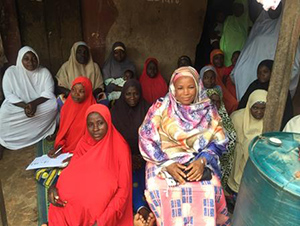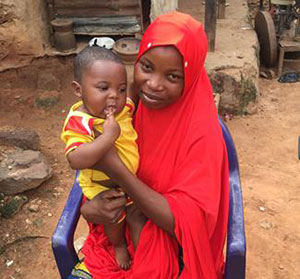
The Power of Knowledge
Many caregivers of infants and young children in the Toto Local Government Area (LGA) of Nasarawa State, Nigeria, have had no reliable source of information about infant and young child nutrition. That was why most women exclusively breastfed their babies for only three months even though the World Health Organization recommends breastfeeding for six months before introducing complementary solid foods and water.
In May 2015, Hajiya Abdullahi, an orphan and vulnerable children (OVC) desk officer at the Ministry of Women Affairs and Social Development in Toto LGA attended a training on infant and young child nutrition practices led by SPRING. After the training, she was determined to use the knowledge she gained to improve the health of infants and young children in her area by improving the mother or caregiver’s feeding practices.
From Student to Teacher
In July 2015, SPRING supported a three-day training in Toto conducted by Action Aid Pact (AAP), a local civil society organization working with the USAID-funded SMILE program (a SPRING partner). Participants included community volunteers and primary health care workers. Hajiya served as one of the trainers, helping form support groups during the training, and attending their meetings in the months after to monitor their progress.
IYCF support groups have empowered these women to feed their babies well and have given us a sense of belonging, too.
-Hajiya Abdullahi, OVC desk officer

Hajiya and SPRING-trained staff from civil society organizations visited community volunteers to ensure that they were giving mothers and other caregivers the correct nutrition information and helping them adopt new practices. She conducted home visits to provide guidance on exclusive breastfeeding and encourage family members to support lactating mothers. She also reminded caregivers to attend support group meetings and health awareness activities, and to make routine visits to the health facilities.
A Ripple Effect
Although she is just one person, Hajiya has had a tremendous effect on the communities in Toto. Many people sing her praises, including Baba Dankaka, a community volunteer and support group facilitator in Angwan Wagau. “These IYCF support groups have really helped the women in my community, “ Baba says. “Hajiya always goes to their homes to ensure they attend meetings. She supports me. More women are now interacting with each other and sharing cooking tips amongst other things.”
Other women also remark on the value of the support groups. Zahila Abdulahi from the Adadu community says, “When I was three months pregnant, I joined the support group. I learned that I should not give my baby water and to only give breast milk until six months. Now my baby is five months and he’s so healthy. I am proud to show him off to my neighbors.”
SPRING’s efforts have not only improved infant and young child feeding practices in Toto; they have heightened Hajiya’s sense of purpose. Now that she realizes the importance of optimal feeding practices, Hajiya will keep spreading her new knowledge and skills for the benefit of the entire community.